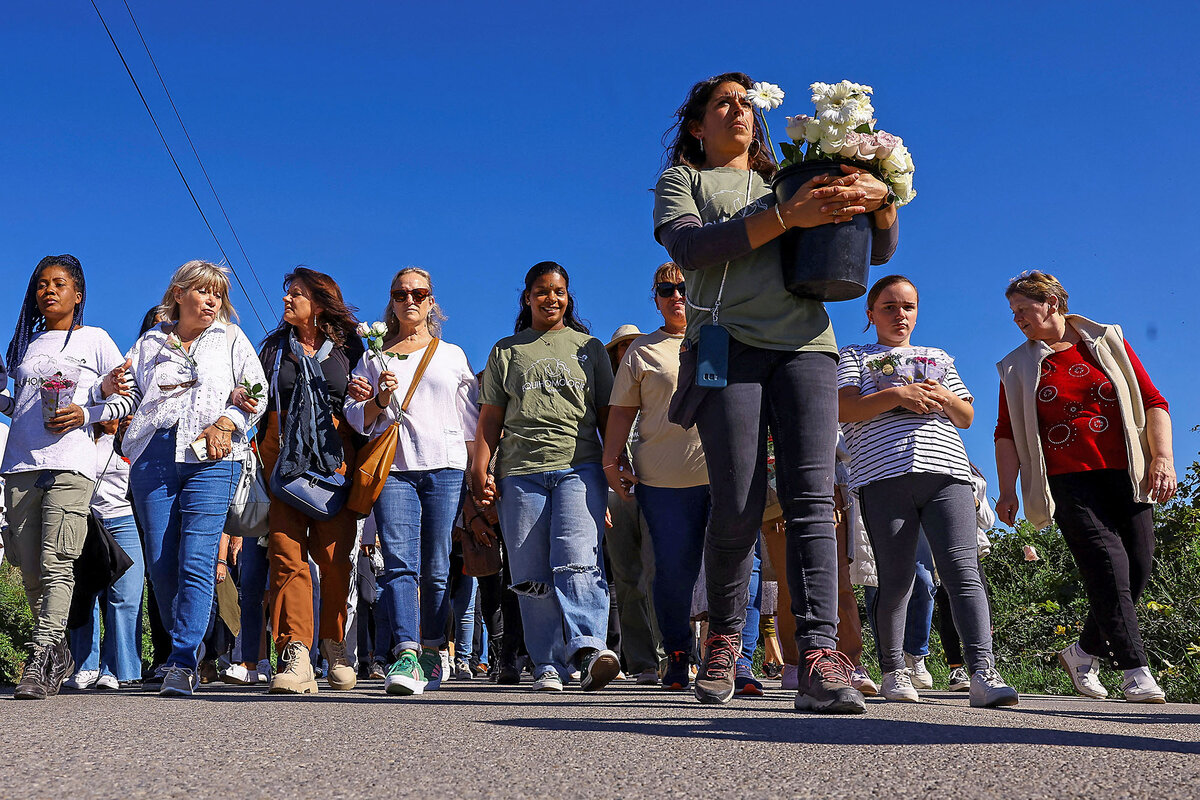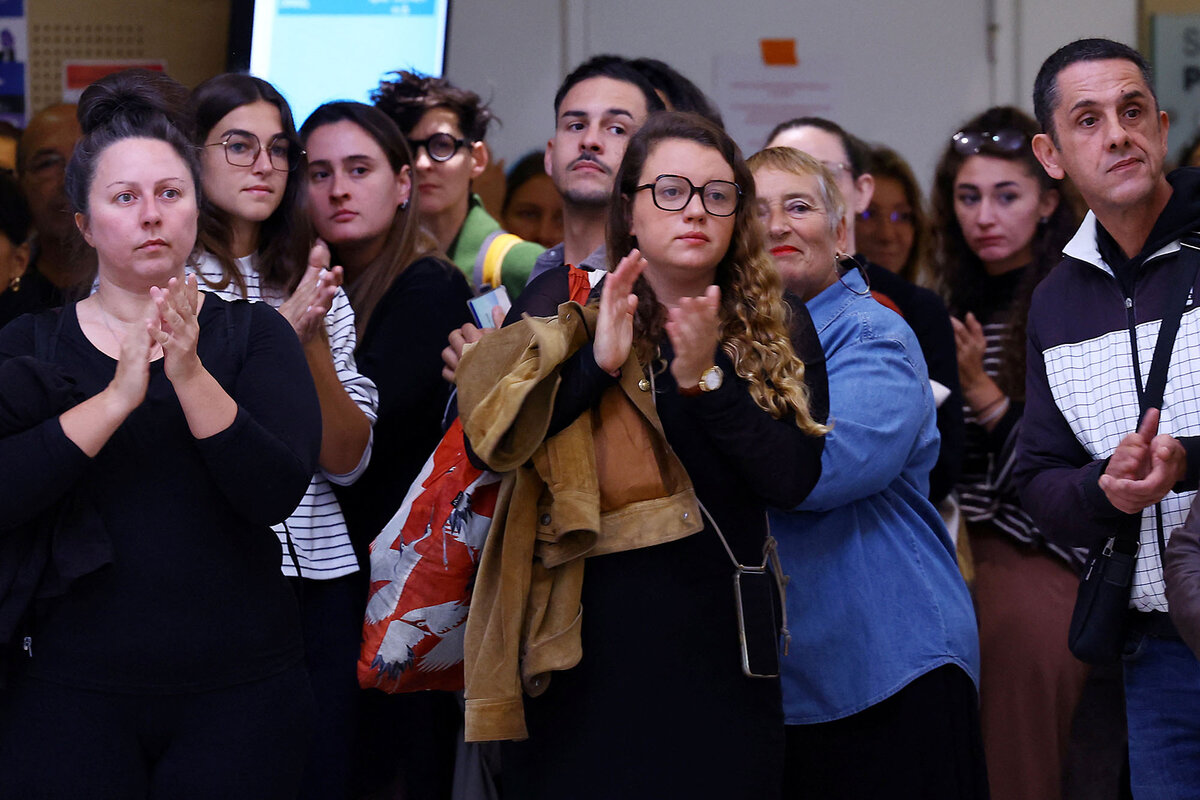A French rape victim goes public. She makes ‘shame change sides.’
Loading...
| Paris
As Gisèle Pelicot enters the Avignon courtroom where her husband and dozens of co-defendants are on trial for raping her, she is often welcomed by applause from crowds outside. A woman of a certain age, Ms. Pelicot stands tall, sporting a stylish bob and sunglasses. She is not afraid to look her alleged rapists in the eye.
Ms. Pelicot is not a typical rape victim. On Sept. 2, her husband, Dominique Pelicot, went on trial over charges of drugging and raping her repeatedly over a decade, and for soliciting 50 other men to engage in sexual acts with her while she was unconscious.
The violence and scale of the crimes have shocked France. But instead of remaining anonymous – a right that French victims of rape typically exercise – Ms. Pelicot has opened her trial to the public and the press, asking reporters to publish her full name.
Why We Wrote This
Gisèle Pelicot, a French rape victim, has turned down her legal right to anonymity and demanded her name be published. She is asking that rapists, not those raped, carry the burden of shame.
In revealing her face and forcing people to confront her husband’s acts, Ms. Pelicot is changing public perceptions of what it means to be a victim. Many here are calling her a feminist icon.
But the larger question is just how much influence Ms. Pelicot’s daring act will have on France. Does she herald a sea change in how rape and rape victims are treated in French society? Or will the specifics of her story prove too narrow to have a lasting effect?
“Gisèle Pelicot has become a figurehead of what we hope is a turning point in sexual violence cases,” says Elsa Labouret, a spokesperson for the women’s rights group Osez le Féminisme. “By showing her face and refusing a closed trial, she’s asking people to look at what’s going on and make shame change sides. She portrays someone who no longer has to carry that shame.”
“We are all Gisèle”
French police first investigated Mr. Pelicot in 2020, when he was arrested for allegedly filming up women’s skirts in a supermarket. When the police opened his computer hard drive, they found more than 20,000 images and videos of apparent sexual assaults he and others had committed against Ms. Pelicot between July 2011 and October 2020 while she lay listless.
At the start of the trial that is expected to run until December, Mr. Pelicot told the courts, “I am guilty of what I did.” He admitted to drugging his wife with sleeping pills and antianxiety medications, and raping her two or three times a week. He claimed that the 50 accused men he solicited online to engage in sex acts were fully aware of what they were doing.
Despite the horror of the crimes, Ms. Pelicot has, from the outset, shown up to court each day to observe often crude witness testimony and video evidence involving events she wasn’t conscious of. Her poise and courage pushed thousands of women’s rights supporters into the streets of France in mid-September, with signs reading, “We are all Gisèle.”
“When it comes to sexual violence – especially domestic violence – there is a feeling that this is a private affair that should remain behind closed doors,” says Janine Bonaggiunta, a Paris-based lawyer who specializes in domestic violence. Victims of sexual assault have the right to keep their identity private during criminal proceedings in France, and most, she adds, exercise that right. “There are always fears of a backlash, threats, and harassment.”
Ms. Pelicot has had to draw on her courage to defend herself. Lawyers have challenged her in court about photographs depicting her conscious and intimate with her husband, or walking nude in her bedroom. “I feel like I’m the guilty one, and the victims are sitting behind me [in court],” she said about the co-defendants during the trial.
That’s a common experience for victims of sexual assault in France. Police officers are poorly trained to handle sexual assault complaints, and over 80% of cases – and 91% of rape complaints – are thrown out before coming to trial.
Experts say the stereotype of sexual assault victims – a woman in provocative clothing who was perhaps consuming alcohol or “asked for” the abuse – often deters victims from coming forward.
Sarah Hunt was living in Paris in 2011 when she went out with friends and woke up the next morning in a hallway of an apartment that wasn’t her own, with bruises on her inner thighs. After consulting with friends and doctors, she realized she had been drugged and sexually assaulted. She took her case to court, and eventually won it. But because she had consumed alcohol the night before, she often felt as if she was the one on trial.
During a court-ordered psychiatric evaluation, Ms. Hunt says the psychiatrist told her, “‘I think you drank too much and don’t want to admit that something happened.’”
“It was terrible,” says Ms. Hunt, who has since moved back to the United States. “He asked me so many questions about my family, anything about my childhood that would make me seem like a crazy person.”
“She is no longer submissive”
On Friday, Ms. Pelicot said that she had won “a victory,” after a judge allowed video evidence of her abuse to be released to the public.
“This trial shows us the current rape culture, which involves domination, possession, and, especially, submission,” says Caroline Legendre, a Paris-based psychologist who has worked with both victims and perpetrators of sexual assault. “Mr. Pelicot had to drug his wife to make her submissive. But by taking her case public, she is no longer submissive. She is active and the principal actor in her story.”
Ms. Pelicot’s supporters hope that her courage will spread, even if her particular circumstances make her the “ideal victim.” Her choice to go public may affect the results of the trial, which is being held without a jury.
For survivors of sexual assault, like Ms. Hunt, Ms. Pelicot’s case changes the narrative of sexual assault crimes, a narrative usually owned by the attacker. And that, she says, is paramount.
“It’s so empowering to hear a victim’s name. Gisèle Pelicot isn’t afraid to say what happened to her,” says Ms. Hunt. “When you’re a victim of sexual violence, you lose your power. [Ms. Pelicot] is showing us how to take that power back.”








